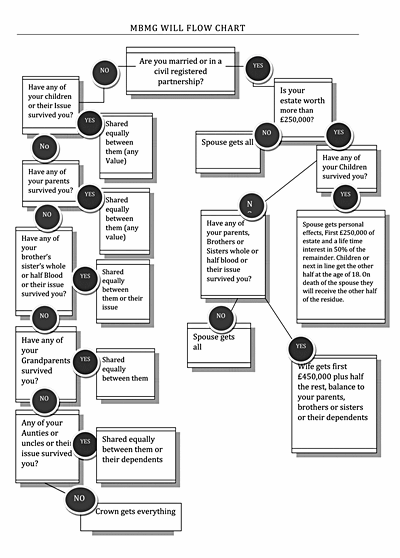Inheritance Tax
The new coalition government in the UK has not yet managed to raise inheritance tax (IHT) to £1,000,000, so the single persons IHT Nil Rate Band (NRB) threshold remains at £325,000 for 2010/11. Once that threshold has been hit, so will your estate for 40% on everything thereafter. Married couples or civil partnerships are allowed to pass their possessions and assets to each other tax-free and, since October 2007, the surviving partner is now allowed to use both tax-free allowances (providing one was not used at the first death) giving a total of £650,000.
Making a Will gives you the opportunity to ensure that the effects of the tax system can be minimized, and can maximize the benefits for those whom you leave behind. Keeping an up-to-date and well drafted Will should be seen as a fundamental and essential part of any Inheritance Tax Planning.
A small example of IHT at work:
You leave behind £600,000. The first £325,000 Nil Rate Band (NRB) is tax free. The rest is taxed at 40% (£110,000 – this example is for a single person). However, if you have your permanent home in the UK when you die but your spouse or civil partner is a non-UK domicile, then you can only leave them the NRB and a further £55,000 tax-free.
In Thailand there is no death tax…yet! However, the UK Government will tax you on your worldwide assets.
Here is a Top 10 ten run down of how to pay less IHT:
No. 10 – Do Mention the War! – If injuries suffered during military service are a factor in anybody’s death, then that person’s estate may become IHT free.
No. 9 – Buy some farmland and rent it out – Agricultural land that is let out can become IHT-free after 7yrs and could be IHT-free after two years if you play a part in farming it.
No. 8 – Spend, spend, and spend some more – Sounds silly, but if you don’t have it, they cannot tax it!
No. 7 – Give to charities and political parties – That’s right! Leaving money to a charity will leave it IHT free on the amount you leave, give it to the politicians for the Christmas party and again its tax free!
No. 6 – Use up the smaller allowances, they all add up! – £5,000 from each parent to each adult child when they marry, the annual exemption, this is an amount that can be gifted free of IHT, currently £3,000per year, you can also carry forward the exemption for a year so you can give £6,000 per person so if you’re married; the total maximum you can give is £12,000 every two years!
No. 5 – Money to spare at the end of the month? – As long as they are regular, made out of income and do not reduce your standard of living, these gifts are IHT free.
No. 4 – Start you’re giving now! – All gifts made more than 7yrs before you die are free of IHT.
No. 3 – Become a Non-Dom – However, you must leave your country of birth and have nothing to do with the place to try and prove that you are Non-Domiciled.
No. 2 – Keep it in the family – A discretionary trust can be set up, up to the Nil rate band of IHT of £325,000 per person or £650,000 for a married couple/civil partnership to be sheltered from IHT, so long as you survive 7yrs and unlike gifts, this will let the donor retain control of the assets.
IHT No. 1 – Make a will – This is the first step to avoiding IHT nightmares; get sound legal, tax and financial advice and do it right.
A Living Will
Also known as Advance Decision, it provides an opportunity for people to lay out their wishes regarding medical treatment and intervention in the final stages of life. Every adult with mental capacity has the right to refuse or agree to medical treatment. The sorts of treatments usually covered by Living Wills are artificial feeding, mechanical ventilation, antibiotic therapy and resuscitation. Like a normal Will you can include personal details and demands, how you want your remains to be disposed of, you might want to put in how and where you might want to spend your final few weeks. These can be cancelled at anytime, either verbally or in writing, just as long as you have the mental capacity to do so.
Whether it is a Living Will or a Last Will & Testament, make sure you have one in place because if you do not then there is no way your beneficiaries will get what you want them to have as quickly as they should have done.
Meanwhile, have a good look at the flow chart to see what happens to your estate in England and Wales.

GRAPH: MBMG Will Flow Chart
The above data and research was compiled from sources believed to be reliable. However, neither MBMG International Ltd nor its officers can accept any liability for any errors or omissions in the above article nor bear any responsibility for any losses achieved as a result of any actions taken or not taken as a consequence of reading the above article. For more information please contact Graham Macdonald on [email protected]




